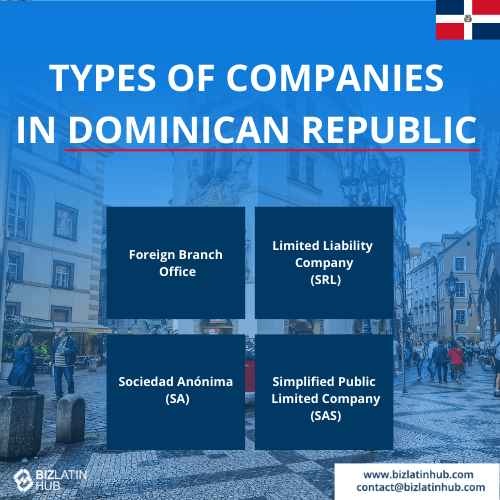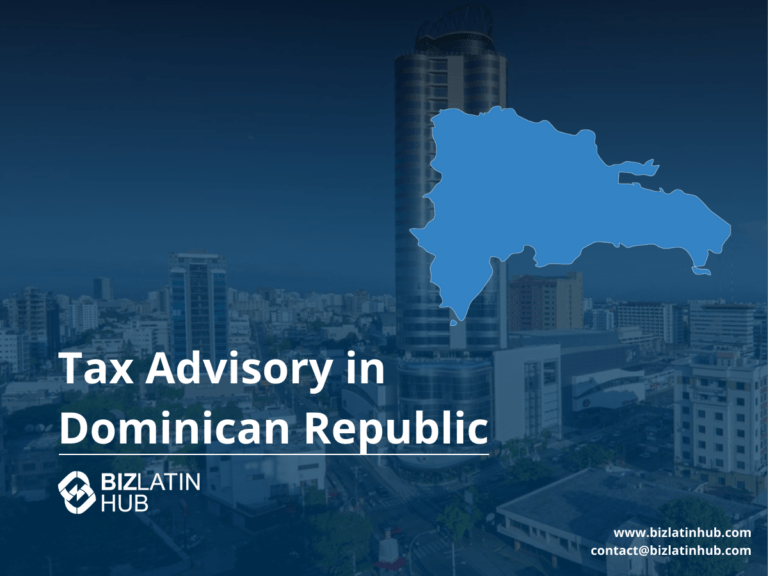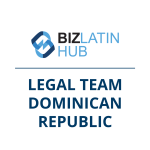Understanding the complexities of legal entities in the Dominican Republic is essential for choosing the right corporate structure when looking to incorporate a company in the Dominican Republic. Understanding and adhering to all legal and accounting requirements specific to the types of companies is paramount for smooth operations and compliance. Collaborating with local experts allows you to navigate the regulatory framework with confidence and clarity. Whether opting for flexibility or liability protection, at Biz Latin Hub, we provide the knowledge and support you need to ensure seamless integration into the Dominican Republic’s entrepreneurial ecosystem.
Key Takeaways
| Common legal entity types in the Dominican Republic | Limited Liability Company. Simplified Limited Company. Limited Company. |
| What is the most common Dominican Republican business entity? | The entity type we most commonly reccomend is the Sociedad de Responsabilidad Limitada (S.R.L.) that is very similar to an LLC in the US. |
| What are the primary considerations when choosing a business entity in the Dominican Republic? | Ownership Structure. Tax Efficiency. Profit distribution. Transfer Pricing. Compliance. Flexibility. |
3 Types of companies in the Dominican Republic
When looking to enter the Dominican Republic, foreign investors are confronted with a choice in terms of what sort of commercial presence they want to have. Expanding multinationals must incorporate a company in the Dominican Republic as a formal corporate vessel for business.
Branches and representative offices are viable options for multinational companies. However, choosing the best type of company must be done on a case-by-case basis.
- Limited Liability Company.
- Simplified Limited Company.
- Limited Company.
Below we review the different types of companies in the Dominican Republic for incorporation.
1. Limited Liability Company
The Limited Liability Company (Sociedad de Responsabilidad Limitada, or SRL in Spanish) is historically the popular choice for typically small businesses. It is quite appealing in the sense that the social capital required to incorporate the company in the Dominican Republic is quite reasonable and low.
This type of company requires a minimum of 2 shareholders which can be either individual persons or other legal entities. The shareholders can have a local or a foreign domicile. In terms of administration, at least 1 director is required to manage the SRL legal entity.
Regarding tax compliance, it is necessary for this type of company to file annual financial statements to tax authorities. Furthermore, the company’s account needs to undergo an annual audit.
2. Simplified Limited Company
The Simplified Limited Company is also known as Sociedad Anónima Simplificada or SAS in Spanish. It is the preferred legal entity for company incorporation in the Dominican Republic when one is looking to raise capital. It is easier to do so than for example in the previously explained SRL. In other words, this type of company in the Dominican Republic is quite appealing as well for entrepreneurs looking to be that next unicorn.
This type of company requires a minimum of 2 shareholders which can be both individuals or legal entities. The shareholders can have a local or a foreign domicile.
In terms of administration, at least 1 director is needed to manage the SAS legal entity.
All SAS companies require a higher initial company capital – approximately 3 times the amount – than that needed to incorporate an SRL.
3. Limited Company
The Limited Company is also known as the Sociedad Anónima or SA in Spanish. Typically, this corporate structure is best suited for larger-sized companies that will likely participate in the stock market, publicly offering their shares to investors.
This legal entity requires a minimum of two shareholders which can be both individuals and legal entities. The shareholders may have a local or a foreign domicile.
The Limited Company legal entity requires a minimum of three directors to take care of the administration and governance of the company.
Our recommendation: The Limited Liability Company. It is well-suited for small to medium-sized enterprises and foreign businesses seeking to establish a presence in the country. It is a commonly chosen legal entity type for businesses operating in the Dominican Republic due to its simplicity and effectiveness.
Another option: opening a branch
As is the case with Limited Companies in the Dominican Republic, Branches are an excellent option for larger foreign multinational companies. This option has benefits in terms of reputation, banking, and engaging with third parties. It is also a preferable choice if the intent is to engage with local public entities directly or via tenders.
A branch office in the Dominican Republic needs to have in place at least one individual (national or foreign) to act as its representative in the country.
Key Considerations When Choosing Legal Entities in the Dominican Republic
Ownership Structure
Understand whether your chosen business entity allows full foreign ownership. The Dominican Republic generally permits 100% foreign ownership in most industries. However, certain sectors, such as aviation, media, and mining, may have specific restrictions or require additional permits. Evaluating these regulations ensures compliance with local laws and facilitates smooth business operations.
Tax Efficiency
Analyze the implications of the Dominican Republic’s tax system on your business. Corporate income tax (Impuesto Sobre la Renta, ISR) is set at 27%, and a value-added tax (VAT), known locally as ITBIS, is applied at 18% on most goods and services. Businesses may benefit from incentives under the Free Zones Law (Law 8-90), which provides significant tax exemptions for export-oriented companies or those operating in specific industries like tourism and renewable energy. Proper tax planning, including leveraging these incentives, is essential to reduce costs while ensuring compliance.
Profit Distribution
Consider the tax implications of distributing profits. Dividends paid to non-resident shareholders are subject to a 10% withholding tax. Double taxation treaties with countries like Spain and Canada can help reduce withholding tax rates. Structuring your profit repatriation strategies efficiently is vital for maximizing shareholder returns and minimizing tax liabilities.
Transfer Pricing
Comply with the Dominican Republic’s transfer pricing regulations, which require cross-border transactions between related entities to reflect arm’s-length pricing. This is particularly relevant for businesses engaged in imports, exports, or intercompany loans. Companies must maintain proper documentation and submit transfer pricing studies annually if they meet certain revenue thresholds. Non-compliance can result in penalties and increased scrutiny from tax authorities.
Compliance
Prepare to meet the Dominican Republic’s compliance requirements. Companies must register with the National Tax Directorate (DGII) and the Chamber of Commerce. Financial reporting must follow local accounting standards, aligned with IFRS for certain businesses. Monthly tax filings for VAT, payroll, and withholding taxes are mandatory, alongside annual income tax declarations. Labor compliance, including employee benefits and contributions to the social security system (TSS), is essential to avoid penalties. Ensuring adherence to these regulations maintains your company’s legal standing.
Flexibility
Select a business structure that aligns with your operational and strategic needs. The most common types of legal entities in the Dominican Republic are:
- Sociedad de Responsabilidad Limitada (S.R.L.): A popular structure for small and medium-sized businesses, offering limited liability and simplicity in governance.
- Sociedad Anónima (S.A.): Suitable for larger businesses or those planning to raise capital through share issuance. It requires at least two shareholders and a board of directors.
- Sociedad Anónima Simplificada (S.A.S.): A newer, flexible option designed for businesses of all sizes. It allows for fewer corporate formalities and greater adaptability in ownership and capital changes.
Choosing a flexible structure ensures that your business can adapt to changing regulations and opportunities in the Dominican Republic.
Our recommendation: From experience we recommend clients the S.R.L, as it offers limited liability protection to shareholders, flexibility in shareholding structure, management and capital contributions.

FAQs on types of companies in the Dominican Republic
1. Can a foreigner register a company in the Dominican Republic?
Foreigners can register all types of companies in the Dominican Republic. The process involves fulfilling certain requirements and complying with local regulations. Legal assistance and consultation with experts can streamline the registration process for foreign entrepreneurs.
2. What type of legal entity is recommended in the Dominican Republic?
The recommended legal entity in the Dominican Republic depends on various factors such as liability protection, taxation, and operational flexibility. One commonly recommended type is the Limited Liability Company (LLC), which offers a balance of liability protection and tax advantages.
3. How do I create a legal entity in the Dominican Republic?
To create a legal entity in the Dominican Republic, businesses need to follow a series of steps, including choosing a business name, preparing incorporation documents, and obtaining necessary permits and licenses.
4. What is an LLC in the Dominican Republic?
In the Dominican Republic, an LLC, or Limited Liability Company, is a business structure that combines the benefits of both partnerships and corporations. It provides limited liability protection to its members while allowing for pass-through taxation and flexibility in management.
5. What is the business structure of a Simplified Shares Company (S.A.S) in the Dominican Republic?
The Simplified Shares Company (S.A.S) offers a combination of speed, flexibility, and investor-friendly features that make it a suitable choice for businesses looking to establish a presence in the Dominican Republic.
Why Invest in the Dominican Republic?
The island nation has a great deal to offer for business owners looking to enter the region. According to the World Bank, the country has the second-highest GDP figures in the Caribbean. This means that all of the types of companies in the Dominican Republic are catering to a strong internal market.
In recent years, we have seen an important increase in foreign direct investment into the Dominican Republic. This takes place specifically in the manufacturing, real estate, export, and tourism sectors. This region has also made a name for itself as an appealing hub for foreign businesses through its tax and migration offerings.
Find the right types of companies in the Dominican Republic for your business
Understanding the differences between the types of businesses in the Dominican Republic can provide many advantages. However, finding the right legal entity in another country can be very challenging.
Our multilingual team from Biz Latin Hub has vast experience in Latin America and the Caribbean. Our local lawyers and professional accountants provide you with tailor-made business solutions. We offer a wide range of market entry and back-office services, such as company incorporation and other legal services, due diligence, visa procedures, PEO and hiring support, payroll management, accounting and taxation, and more.
Get in touch with our specialists to start your business in the Dominican Republic soon!
Learn more about our team and expert authors.






